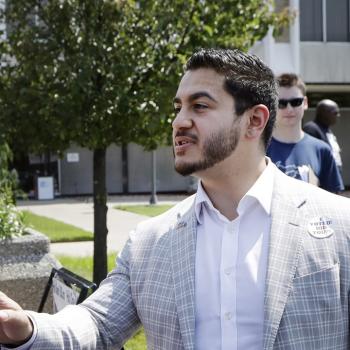Sharmeen Obaid-Chinoy’s Oscar Academy Award win for Pakistan last Sunday, a first for the country, is a bittersweet victory. While the country rejoices in the worldwide recognition of an Oscar for Saving Face as a Documentary Short, the topic of the film — women who are the victims of acid burning — highlights a dark problem in the struggle for female emancipation in Pakistan.
Fitting then, that Obaid-Chinoy dedicated her Oscar to that effort in her acceptance speech: “All the women in Pakistan working for change, don’t give up on your dreams, this one is for you.”
On one hand, while Pakistan produces educated, enlightened and talented females like Obaid-Chinoy, it also bears witness to victims of acid throwing, like 25-year-old Rukhsana, who is featured in the documentary. Two days before the Academy Awards, I interviewed Obaid-Chinoy, the film’s director Daniel Junge and Dr. Mohammad Jawad, whose work is featured in the film, at a pre-Oscar celebration hosted by Pakistan’s Los Angeles Consular General, Riffat Masood. Our conversation revealed the complexity of pessimism and hope in Pakistan.
“I have always felt that if you are educated and empowered you can become the voice for those that are marginalized and disenfranchised,” said Obaid-Chinoy. The variations that can produce such juxtaposed lives — in a developing country like Pakistan—are the stratum of education, social milieu and background.
Obaid-Chinoy said that despite the problems women in Pakistan face, she felt optimistic. “We have a strong feminine presence: female lawyers and legislators fighting on behalf of these women, who hear the testimonies, write the bills and get them passed in parliament. This shows no matter where we come from in Pakistan, there are people working to make it a more tolerant society,” she said.
In 2010, Junge heard British Pakistani plastic surgeon, Dr. Jawad talking to BBC Radio about surgery on acid victims. When Junge went to Pakistan to catalogue the doctor’s story, the trip became the germination of collaboration between him and Obaid-Chinoy. Saving Face documents the reconstructive work of the Dr. Jawad on some of his patients who are victims of acid attacks in Pakistan. It also focuses on the stories of Rukhsana and Zakia and their efforts to overcome the legal, social and psychological repercussions of that violence.
Obaid-Chinoy also won an Emmy award for her documentary, Taliban Generation (2010) and is the first non-American to win the prestigious Livingston Award for Young Journalists. She said that her “desire to help others” has guided her trajectory as a Pakistani filmmaker, adding that “wherever I have made films around the world, the topics I have chosen are all about giving a voice to the voiceless.”
As Obaid-Chinoy stepped off the Oscar stage after accepting her Oscar, humanitarians and actors Angelina Jolie and Brad Pitt congratulated her and got a copy of Saving Face. Obaid-Chinoy told the New York Times, “It reinforces the fact you can be anyone, come from anywhere and as long as you do quality work, it gets rewarded.”
Pakistan is Addressing Its Problems
At a Saving Face film screening in Pomona College in Pomona, California one day after the Oscar win, Daniel Junge, the documentary’s Colorado-based director, talked to me about the impact of the win as he held his golden statue. “Pakistan is a country too easily summed up by the international media in simple terms, it is by far the most complex place I have been to,” he said.
I asked him if this film would reinforce some of those narrow views. He said that he “felt people would come to the movie” with a “certain bias.” But, film viewers “owe it to the documentary film genre to come with open eyes and realize the film is about Pakistanis addressing their problems, not just a showcase of problems.”
This reinforced what Obaid-Chinoy said earlier, that as an “emancipated woman” who enjoyed “liberties,” she produced the documentary because it perturbed her that “many other women don’t have that freedom.”
There are 100 reported cases of female acid attacks in Pakistan annually, yet it is a universal problem with pockets prevailing in South Asia, South America and Africa. Dr. Jawad initiated cutting edge techniques of burn treatment in the reconstruction of Katie Piper — a British model who had sulphuric acid thrown on her face by a stalker in 2008.
I asked Dr. Jawad if female victimization is a social predicament spreading in developing countries — regardless of religion and culture. He said with characteristic British humor, “In Pakistan, this is a man-made disease — not a religious phenomenon. By addressing it and giving the idiotic perpetrators a swift kick in the rear, some hope can exist.” He went on to clarify that the core causes of acid throwing are poverty, illiteracy and ignorance.
Hope Does Exist
Consular General Masood also discussed the dual factors of oppression and optimism for women in South Asia, “People do not talk about such problems, but due to the growth of civil democracy, Pakistan is moving ahead. We are addressing social issues, moving towards solutions and establishing better laws thanks to the activism of people like Sharmeen.”
Pakistan’s government seems to agree, as Prime Minister Yousaf Raza Gilani announced on Tuesday that a civil award would be conferred on Obaid-Chinoy for the Oscar win.
Amidst the agony, hope does exist. Saving Face highlights the mêlée for women’s rights in Pakistan by activists, lawyers, journalists and politicians like Marvi Memon. The movement led Pakistan’s parliament to pass two bills — the Acid Control and Acid Crime Prevention Laws — in December of 2011. These bills enforce imprisonment and heavy fines on the perpetrators of these crimes. Obaid-Chinoy said that the passing of the bills is a testament that “the documentary is really a story about how educated women can help underprivileged women in Pakistan.”
Pakistani-American actor Iqbal Theba, who plays the principal in the FOX program Glee, told me at an Oscar celebration that he derives much “pleasure and pride that a fellow Pakistani” won the Oscar for “voicing an opinion which needs to be heard, not to mention, an opinion not many people are uncomfortable about.” He continued in his authoritative Glee principal’s voice, “If you are a nation with a conscience, you need to take a hard look at who you REALLY are.”
Consular General Masood admitted the topic of the film is “disturbing” for mainstream audiences but said, “don’t stigmatize us.” She said Pakistanis in the past few decades have “recognized the problem of female exploitation” and have been “diligently working towards reformation.” Acid throwing “stretches from Uganda to Cambodia,” Masood said, adding that she hopes Chinoy-Obaid’s Oscar win “will bring global awareness about acid throwing.”
At the Pomona College viewing of Saving Face, held one day after the film’s Oscar win, the auditorium was bursting at the seams. The audience reacted visibly and verbally to the documentary: They gasped at the horrific stories of Rukhsana and Zakia; laughed at Dr. Jawad’s flippant quips; snorted when the perpetrators were interviewed and cheered at the sentencing of one of the criminals, who received two consecutive life sentences for acid throwing.
At one point in the film, there was a palpable lump-in-the-throat silence when Dr. Jawad stopped an interview with a victim of acid throwing, took off his foggy glasses and wiped his eyes. It was therapeutic and promising.
Want to learn how you can help? Visit the Acid Prevention Foundation, a non-for-profit featured in Saving Face at http://acidsurvivorspakistan.org/you-can-help Saving Face airs on HBO on March 8 in the U.S. and Canada at 8:30-9:15 p.m. ET.
Sadia Ashraf is a Los Angeles-based public relations and communications specialist. She has spearheaded international publicity campaigns for several organizations, films and books. Ashraf also raises funds for charities and serves as a board member at Zindagi Trust and Shine Humanity.















